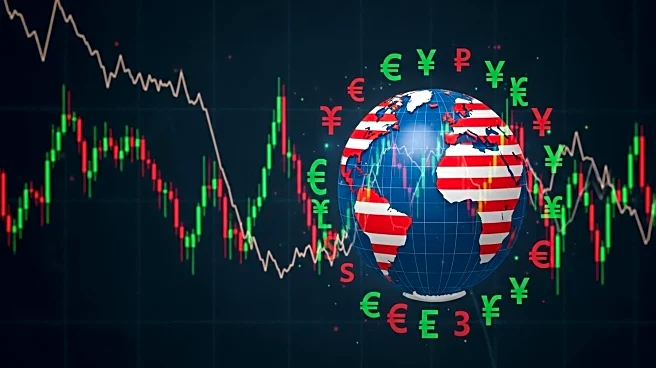What's Happening?
President Trump's recent imposition of 100% tariffs on pharmaceutical products has led to significant market disruptions across Asia. Major stock indexes, including Japan's Nikkei 225, Hong Kong's Hang Seng, and India's Sensex, experienced declines. The tariffs, coupled with strong U.S. economic data, have reduced expectations for aggressive Federal Reserve rate cuts, further unsettling markets. The Indian rupee neared record lows, and South Korea's won fell to a four-month low amid stalled trade talks with the U.S. In response, several Asian governments, including China and South Korea, are taking measures to stabilize their economies, such as maintaining liquidity and extending foreign exchange trading hours.
Why It's Important?
The tariffs have significant implications for global trade and economic stability. The pharmaceutical industry, particularly in India, faces potential losses as up to 35% of its exports could be affected. The market volatility underscores the interconnectedness of global economies and the potential for U.S. policy decisions to have far-reaching impacts. Investors are cautious, with many strategists suggesting that the tariffs were anticipated, yet the uncertainty continues to weigh on market sentiment. The situation highlights the delicate balance between trade policies and economic growth, with potential repercussions for U.S. industries reliant on Asian markets.
What's Next?
Market participants are closely monitoring upcoming U.S. economic data, such as the core PCE inflation report, which could influence Federal Reserve rate decisions. The start of the U.S. Q3 earnings season will also be pivotal in assessing the broader economic impact. Additionally, any developments in U.S.-China or U.S.-India trade negotiations could significantly affect market dynamics. Analysts predict continued volatility in the short term, with potential stabilization if trade tensions ease and central banks provide supportive measures.
Beyond the Headlines
The tariffs raise questions about the long-term sustainability of current trade policies and their impact on global supply chains. The situation may prompt companies to reconsider their manufacturing and export strategies, potentially leading to shifts in global trade patterns. Furthermore, the economic strain on Asian markets could influence geopolitical relations and prompt further policy adjustments by affected countries.










